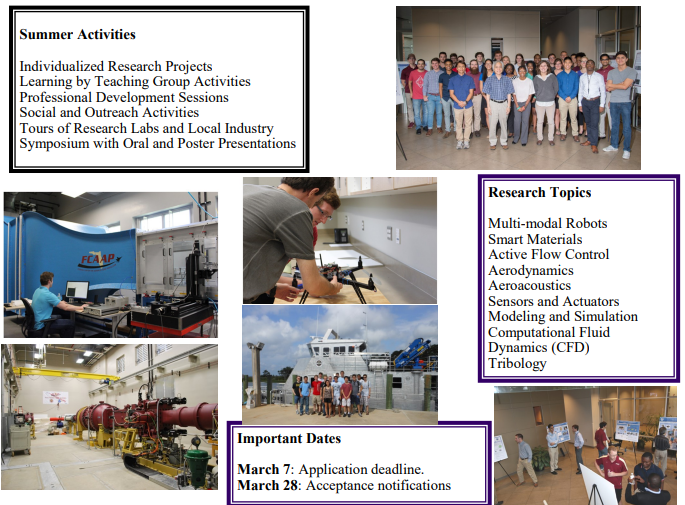Process and Activities
Professional Development Process
The professional development program within the TT-AE REU initiative is structured around five integrated components aimed at fostering early and sustained engagement in aerospace research and education. These coordinated activities are designed to build technical skills, research capabilities, and professional readiness among undergraduate participants. The key components include:
(1) Individualized research projects under the guidance of faculty and graduate mentors;
(2) Group-based learning modules focused on teaching and peer collaboration;
(3) Professional development sessions, including communication, ethics, and graduate school preparation;
(4) Laboratory tours and outreach activities that provide exposure to advanced facilities and promote community engagement;
(5) A culminating symposium where students present their research through oral and poster presentations.
Together, these activities offer a comprehensive framework that supports experiential learning, mentorship, and professional growth, equipping participants with the competencies necessary to pursue advanced degrees and careers in aerospace and mechanical engineering fields. A visual process diagram is typically used to illustrate how these activities are interconnected and aligned with the program’s overarching educational objectives.
TT-AE Representative Programmatic Efforts and Events
Activities and Major Events
Annual TT-AE Research Symposium – August 1
Individualized Research Projects:
TT-AE participants engage in research projects guided by faculty and graduate mentors in areas such as multi-modal robotics, smart materials, active flow control, aerodynamics, aeroacoustics, tribology, and computational fluid dynamics (CFD). These projects are designed to develop research proficiency and deepen technical expertise.
Group Learning and Teaching Activities:
Structured group-based sessions encourage students to collaborate and learn from one another. Students participate in “learning by teaching” activities, enhancing both their technical communication and conceptual understanding.
Lab Tours and Industry Engagement:
Throughout the program, participants visit advanced research laboratories and local aerospace-related industries, gaining exposure to real-world engineering environments and innovative technologies.
Professional Development Activities:
TT-AE offers a suite of development sessions, including responsible conduct of research (RCR) training with certification, project proposal presentations, mentorship and peer engagement workshops, seminars on graduate school and career paths, technical communication workshops, and research update seminars.
Social and Outreach Activities:
Students participate in team-building events and community outreach initiatives aimed at broadening the impact of aerospace research and promoting STEM awareness among younger students.

Annual TT-AE Symposium:
The program culminates in a symposium where participants present their work through oral and poster presentations.
The symposium includes:
-
Technical research presentations delivered in a hybrid format.
- A poster session for sharing project outcomes and research impacts.
-
Group reflection discussions and feedback exchanges with peers and mentors.
-
Program outcome evaluation involving faculty, mentors, and institutional partners.


